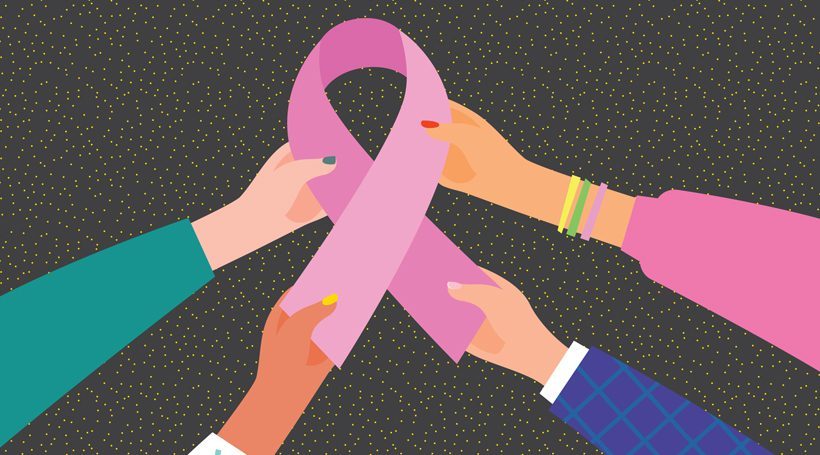Continuing our influential roundtable series on topics important to South Jersey, SJ Magazine gathered 7 specialists for an in-depth conversation on breast cancer.
Participants:
Nikki Ariaratnam, MD, Breast Imaging Specialist, South Jersey Radiology
Nandini Kulkarni, MD, Medical Director, Surgical Oncology, Inspira Health
Kristin Brill, MD, Enterprise Director, Breast Oncology Sidney Kimmel Cancer Center – Jefferson Health
Rachel Levenbach, MD, Oncologist, Regional Cancer Care Associates
Holly Lookabaugh-Deur, PT, OncCS, Director, Oncology Rehab Residency, Ivy Rehab
Kaitlyn Kennard, MD, Breast Surgeon, Sidney Kimmel Cancer Center – Jefferson Health
Lori Timmerman, DO, Breast Surgeon, Penn Medicine | Virtua Health Cancer Program
How the field has advanced since they started…
It’s absolutely night and day – just thinking about how extensive surgery used to be versus now. Our decisions today are so focused on each patient and are so much more conservative. It’s amazing to think back on how extensively we used to operate on some of our patients.
Nandini Kulkarni
When I started, breast fellowships were just evolving, so pretty much breast surgery was done then by general surgeons and not by specialists.
Kristin Brill
The options for surgery are just so great now. For example, women who undergo a mastectomy have the opportunity to preserve the nipple and do a nipple sparing mastectomy. We also have direct-to-implant reconstruction – if the patient is a candidate for that – which will minimize the number of surgeries they need. With the increased options we have for patients, we really can tailor care to a patient’s specific needs.
Kaitlyn Kennard
Screenings for the detection of breast cancer have changed dramatically in the past 30 years. We moved from actual floppy films that we would hang up in the reading room, to digital mammography to something called Digital Breast Tomosynthesis or 3D mammography, and now we adjunct with breast MRI, breast ultrasound and contrast-enhanced mammography. There’s just a plethora of different imaging techniques now.
Nikki Ariaratnam
Why they love what they do…
When I was 13 years old, my mom was diagnosed with ovarian cancer, which is very hard to detect and usually detected at a late stage. Although my mom did fight and survive for a very long time, I learned that detecting cancer early is our best chance for long-term survival. I wanted to be part of the solution, so no one has a loved one suffering.
Nikki Ariaratnam
It’s really a privilege to be a part of the patient’s journey. I can see someone right when they’re first diagnosed all the way through survivorship and surveillance. I can be a part of restoring them to full function and loving their body again.
Holly Lookabaugh-Deur
Nobody expects or plans for a breast cancer diagnosis, but the opportunity to be there for these women and say, “Hey, we’re going to get through this together,” and then see them through that journey is such an honor.
Kaitlyn Kennard
I evolved into this role. I did about 7 years of general surgery before this. The procedures and relationships you have with your breast cancer patients versus general surgery patients are totally different. The relationship with our patients is very, very personal. And that’s a privilege.
Lori Timmerman
This is an amazing field. We’re all so lucky to be in it. The moment you meet a patient and you begin to understand her personal story, then you mesh that with the medicine and science behind what we do – it’s a journey that is rewarding on so many levels.
Kristin Brill
It’s rewarding when you have that last hug, when they say, “I didn’t think I would make it this far.” It’s not a feeling you can put into words. But we see the reverse of that, too. Unfortunately, although it’s rare now, we do see adverse outcomes, when there is progression of disease. It is also an honor to be able to walk those patients through their process.
Nandini Kulkarni
Helping patients love their bodies again…
That’s very much part of what I do. Helping a patient love their body is making them see that they deserve to feel better, they are a whole person, and they are not less coming out the other side of this.
Holly Lookabaugh-Deur
I try to dispel any misconceptions and give them options so they can get to a point where they look in the mirror and feel happy, not just now, but years from now. I try to set this goal for them: Think about when you are cured and happy and living your normal life. What do you want your body to feel and look like? It’s amazing to be able to give them that hope.
Nandini Kulkarni
This can be a hard concept, especially for women who have a mastectomy – a lot of women say they’ll avoid a mirror. But a lot of plastic surgeons today do a fantastic job of making the breasts look as natural as possible. At the end of the day, most women understand they did what was necessary to survive breast cancer.
Rachel Levenbach
A lot of women think they’re going to just get this done and move along. They don’t realize they’re going to be dealing with the aftermath for quite some time. Once all the stress starts to come down after surgery, radiation and other treatments, they look back and say, I can’t believe I did all that. Seeing everything they went through changes their perspective. It takes some time for some people to adjust, while others snap back right away and take it in stride. But it can definitely be a struggle.
Lori Timmerman
How Google affects their work…
Just about everybody Googles before they come in. They get ads for things that say they will save their life. I’ll show them national guidelines and the treatments that have been researched and proven to work. They’re trying to feel empowered, but often that information is definitely not right.
Lori Timmerman
When people are given the diagnosis, it doesn’t mean the same thing for every patient. So if you search on Google, the information you get will run the gamut, but really there is no one-size-fits-all solution. I tell patients everything we plan will be personalized to them. What they find online may not apply to them.
Nikki Ariaratnam
Dr. Google is my nemesis. The good thing about having patients do research is they’re very engaged, and they’re open to learning. I always make sure I ask what they are hearing, so we can put some of those things to rest and keep them on the right path to education. But what’s on the internet can be really challenging.
Holly Lookabaugh-Deur
The internet can be an incredible tool for patients. They are coming in with more knowledge and feeling more empowered than ever before. But with any tool, it has to be used correctly.
Kaitlyn Kennard
Talking about the diagnosis…
It’s never easy telling a patient their cancer diagnosis. When I see the patient for the biopsy and I have concerns, I talk to them face to face about what they should expect should the results come back positive, what the next steps might be. I like to know they’ve had someone look them in the eye and give them some idea about what might be coming, so I’m not blindsiding them later. Then when I give patients a bad diagnosis over the telephone, I’ve already shared with them my thoughts. Most often they’ll say thank you so much, because they’ve had some time to think.
Nikki Ariaratnam
The first time I meet a patient, they are already aware they have breast cancer. I always tell patients that whatever I say today, I’m going to explain and repeat multiple times. I tell them if they remember one thing I say at this first visit, it’s a win. And then we go through it again at each visit, because it’s a lot of information to take in.
Rachel Levenbach
Is breast cancer a death sentence…
Breast cancer is really, truly so survivable. Often patients come in and they want to know what stage they are. I try to help them understand that the stage is significantly less important than the tumor type. A very small aggressive tumor is going to pose more of a threat than a larger well-behaved tumor.
Kristin Brill
Death from breast cancer is no longer as common as it used to be. People are being diagnosed earlier and earlier, thanks to amazing screening devices, techniques and protocols. But the fact is that this technology is not uniformly spread across the country. You do have pockets where patients may not have access to what seems so obvious to us.
Nandini Kulkarni
Men & breast cancer…
Breast cancer in men is not particularly common, but it is there. Often what we see with our male breast cancer patients is they feel a lump, but they think they can’t have breast cancer because they’re male, so they don’t seek care. What’s really important is getting those men into treatment early. It’s also important to pursue genetic testing, because often male breast cancers are associated with genetic mutations, and that can have a lot of implications for other family members and children.
Kaitlyn Kennard
Men are usually much more advanced in their cancer when they finally seek treatment. But I find if they can get past the fact that they don’t even want to say they have breast cancer, they are usually very compliant with therapy and seeing things all the way to the end.
Holly Lookabaugh-Deur
There is a level of embarrassment, especially when they need imaging and testing that is associated with women, like mammograms. But men do very well with breast cancer, and a lot of times it’s more of an abbreviated treatment. They may just need surgery or a short course of oral therapy. The more challenging aspect for men is adjusting to the diagnosis.
Rachel Levenbach
Being called a “Survivor”…
Not every woman likes to identify as a breast cancer survivor. For some, it’s just not part of who they have become. Survivorship really means disease-free once you have finished active treatment. But the goal for survivorship is to address other things: body issues, sexual issues, chronic pain, genetics and family.
Kristin Brill
I really don’t like to use the word survivor. I explain it as there’s no evidence of disease, but we have to keep monitoring. I want them to be aware that we still need to follow this. We still need to make sure this isn’t coming back.
Rachel Levenbach
Sometimes I see a patient who’s 10, 20, 30 years out from a breast cancer diagnosis, and it’s not even part of their thinking anymore. They are the people I talk to my next patient about and say, “Listen, the last patient I saw had breast cancer when she was 45, and she’s 75 and can’t even remember where her scar was.” I don’t use the term survivor. I tell patients this is life, and this is how people move through life.
Nikki Ariaratnam
I believe in having the patient thrive, not just survive. And that means a lot of different things for different women. Many women worry about if they caused a risk factor for their daughters, which can be an incessant guilt. You have to explain that it’s not their fault and may not pose a threat. There are so many layers to uncover as the patient moves on from active treatment to surveillance – the word survivor doesn’t quite cut it sometimes.
Nandini Kulkarni
In the rehab world, there’s a real movement to get away from using that terminology.
Holly Lookabaugh-Deur
The role of family/friends…
We sometimes have women who come in with challenging family dynamics, they may care for a special needs child or have a husband who isn’t supportive. So family is important, but it can also be a source of stress. It’s important to help them find that support, which may be from someone outside of their immediate family. But we encourage them to lean on people. This is a time when you really have to figure out who your support system is.
Kristin Brill
It’s always important to have a second set of ears to listen to everything, but the extent of that is up to the patient. There are many women who don’t want to tell their entire family. And the truth is, they don’t need to, maybe they just had a lumpectomy and they’re on a pill. For women who have more advanced disease and need more treatment, it’s good to have someone else who can help if you need them.
Rachel Levenbach
Having people who support you can mean different things to different people. What each patient needs from the people around them is different – some people need a lot of support, some people want to do it themselves. Finding out what a patient needs is very important.
Lori Timmerman
At the initial conversation with the patient, if they don’t have someone there with them, I always ask if there is someone they’d like us to call or someone we can bring into the discussion. I’m giving them a roadmap of what the next year to 2 years of their life will look like. A family member or patient advocate is so integral in that process.
Kaitlyn Kennard
WHAT to say to someone with breast cancer…
We’re gonna get through this together and meet for margaritas at the end of treatment.
Nandini Kulkarni
I’m here, and I’m willing to help any way I can.
Rachel Levenbach
Try not to let fear control everything you’re thinking right now. We’ve got you.
Holly Lookabaugh-Deur
How are you feeling? How can I help?
Kristin Brill























